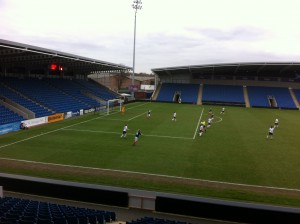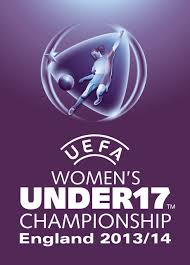 Scotland (0) 0 – 1 (0) France [Julie Marichaud (62)]
Scotland (0) 0 – 1 (0) France [Julie Marichaud (62)]
In this last round of games in Group B, France were already eliminated having lost to Spain and Germany. Scotland though had an outside chance of progressing if they beat France and Spain beat Germany in the other fixture.
As it was, neither game went that way. Germany thumped Spain 4-0 at Hinckley and Scotland lost 1-0.
The crucial goal came on sixty-two minutes, when from a corner French captain Julie Marichaud finished with a sweetly struck volley.
It left Scotland bottom of the Group, but with France ending on a high.
Scotland: Rebecca Flaherty, Courtney Whyte, Sarah Clelland (Dana Baird – 73), Georgie Rafferty (C), Abigail Harrison, Kirsty Howat, Alyshia Walker, Carla Jackson (Rachel McLauchlan – 54), Hayley Sinclair (Chelsea Cornet – 69), Erin Cuthbert, Chantelle Brown. Unused substitutes: Laura Hamilton, Sarah Robertson, Lia Tweedie, Carla Boyce.
France: Mylène Chavas, Estelle Cascarino, Julie Marichaud (C), Elise Legrout, Delphine Cascarino, Clara Mateo, Mathilde Jouanno (Perle Morroni – 77), Soazig Quero, Clémence Martinez (Salomé Elisor – 53), Manon Uffren, Anissa Lahmari. Unused substitutes: Elisa Launay, Heloise Mansuy, Ludivine Willems, Laura Condon, Marine Julian.
 Post-match Interviews
Post-match Interviews
Scotland Women’s Under 17s Coach – Pauline Hamill
Q: A good game, were you pleased with your sides performance?
A: I think we can perform better if we’re being completely honest with ourselves, but when you are in such a tough group and I think the girls felt it physically today. Coming off the back of playing against Germany and Spain and then having to play against France, I just think physically they struggled. But they gave their all again, and they give me everything all the time and I can’t ask for any more than that.
Q: The French coach previously mentioned about the travelling times from St George’s Park, was that an issue at all? Would you like the venues closer overall?
A: I think maybe going forward that might be something to improve the tournament, but I don’t think overall it was an issue for us today. I think it has nothing to do how we lost the game or not performing as highly as we have, but of course it’s always better if the venues are closer to where you are staying. I think all the teams would probably agree with that.
Q: What about the facilities themselves?
A: It has honestly been different class being at St George’s. We’ve absolutely loved it. It’s been great. Like I said, for me, it’s maybe something to improve the tournament moving forward. But it’s not an issue playing after travelling an hour on the bus. I don’t think personally it is an issue.
Q: What about the individual stadium and pitches?
A: Great, Yes, I think they’ve all been good. I think we’ve been fortunate to experience three different pitches. All the staff and everybody have made us feel very welcome and I think they’ve all passed comment on how good the players have been in and around the situation. The fact we got to play in three different stadiums has been really good for us and our development as a team as well.
Q: What do you think the legacy of the tournament will be?
A: I think that when you see so many girls – with the tournament extended to eight teams, when it was four previously – performing at a high level for their national teams I would hope it inspires other girls to play. I know if there have been any girls at any of the games – I know England’s games have been really well supported – you hope and you can only believe that more girls will take up the game and see the level that you can get to as a youth international player. A lot of the players at these Youth tournaments go on and represent their country further down the line, so it’s absolutely achievable if they come in at this age group that they can come in and do well in international football.
France Women’s Under 17s Coach – Guy Ferrier
Q: What’s your feeling about the game today?
A: We’re really happy about the victory, but not only the victory, but the quality of our game. During our first two matches in this tournament we didn’t play all that well, but today we controlled the game.
Q: What have you thought of the tournament as a whole?
A: It is very well organised. We were in perfect conditions at St George’s Park. We didn’t have to travel to go to training which is a good point. The only thing was that the stadiums were a bit away from St George’s Park. But we congratulate the organisation, especially for such young girls.
Q: What does the next year hold for this group of players?
A: This tournament was in November and December and the next will not begin until September 2015. We won’t go in the First Round, we will go in the Elite Round, so that’s March 2015 and it’s a long way off. Some of the girls might join the Under 19 team but that’s not for sure. Having been knocked out of the tournament here early, we don’t qualify for the World Cup [Costa Rica – March/April 2014]. This was a good opportunity for the girls to learn more and take part in a high level of football. They were a bit surprised at the beginning of the tournament to meet such great teams. So now they don’t have any official competition, we might have some friendlies, but it will be a long year.
Q: Who do you think will win the tournament now?
A: If we look at the game against us, Germany is a great team. Although today they lost 4-0 against Spain. Also Italy – we had some friendly games against them in September. We had hoped and planned to play against Italy in the Final, but it didn’t work out that way. Spain are also a good team and will probably qualify for the World Cup.
The Scottish team is very good – excellent – a very brave team. They gave everything in the game they should be very proud.
 Scotball is Stephen O’Donnell’s second novel following on from Paradise Road which was published in 2012.
Scotball is Stephen O’Donnell’s second novel following on from Paradise Road which was published in 2012. Scotland (0) 0 – 1 (0) France [Julie Marichaud (62)]
Scotland (0) 0 – 1 (0) France [Julie Marichaud (62)] Post-match Interviews
Post-match Interviews When England manager Roy Hodgson recently suggested that he would be monitoring the progress of Manchester United’s Belgian youngster Adnan Januzaj, the issue of international player eligibility was once more in the news.
When England manager Roy Hodgson recently suggested that he would be monitoring the progress of Manchester United’s Belgian youngster Adnan Januzaj, the issue of international player eligibility was once more in the news.